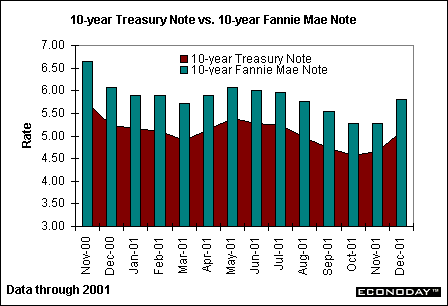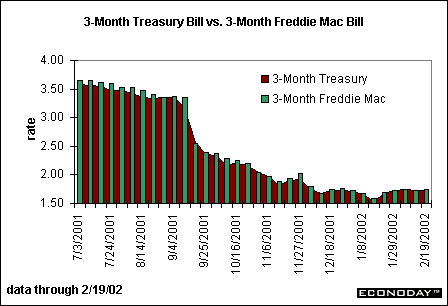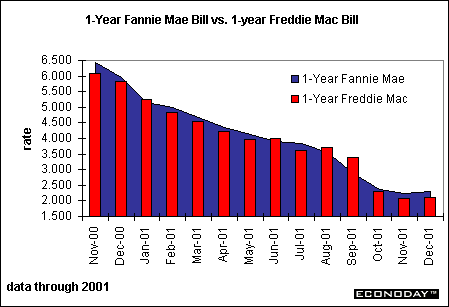When discussing the fixed-income sector, the U.S. Treasury yield curve is most often mentioned, followed by agency and corporate issues. Have you ever wondered what agency securities are? How do they affect financial markets? Well, for the purposes of the fixed income market, there are two major government- sponsored agencies that auction securities to the public: the Federal National Mortgage Association (Fannie Mae) and the Federal Home Loan Mortgage Corporation (Freddie Mac). A mix of private and public elements, these two agencies are corporations operating with government charters. Both Fannie Mae and Freddie Mac assist people with financing the purchase of homes.
Fannie Mae
Fannie Mae securities are similar to U.S. Treasuries in their auctioning and issuance. There are very similar time-frames in these two types of securities, but Fannie Mae securities do tend to be more liquid and offer a higher rate of return than U.S. Treasuries. Securities that Fannie Mae issues include weekly auctions of 3- month and 6-month bills, and bi-weekly auctions of 1-year bills. Fannie Mae also issues 2-year, 3-year, 5-year, and 10-year notes and even issues a long-term 30-year bond. Generally, 2-year, 3-year and 10-year notes are offered twice a year (e.g. February and August of 2002 for 2/3 year notes; March and September for 10-year notes). Five-year notes are offered four times a year, while the Fannie Mae 30-year bond is generally offered once a year. There is no set maximum amount for these securities, however the minimum amount auctioned for Fannie Mae bills is $1.0 billion and the minimum amount for Fannie Mae notes and bonds is $4.0 billion. These securities trade in the open market on securities exchanges. Investors cannot directly purchase Fannie Mae securities at auction, as only a select group of securities brokers are allowed to bid. In this regard, Fannie Mae differs from the U.S. Treasury, which offers a Treasury Direct program where individual investors can purchase securities. Fannie Mae securities offer a higher rate of return than Treasuries and yet remain a relatively risk-free investment thanks to their government charter. Because these Fannie Mae securities are mortgage-backed, they are susceptible to changes in the housing market and changes to interest rates.
Freddie Mac
While Freddie Mac's stock does trade on major equity exchanges, its main supply of assets is through the issuance of securities. Similar to both U.S. Treasury and Fannie Mae securities, Freddie Mac securities are sold at auction. Freddie Mac offers a wide range of bills and notes as well as a bond. Bills of 1-month, 2-month, 3-month, 6-month and 1-year maturities are offered, making these agency securities more liquid in the short- term fixed income market than either Fannie Mae notes or Treasuries. Notes offered through Freddie Mac include 2-year, 3-year, 5-year and 10-year maturities, and there is also a 30-year bond issue. Freddie Mac bills are auctioned weekly, while notes and bonds are auctioned four times a year. The months vary for each longer- term security, and a schedule is released at the start of each year. Just like Fannie Mae, Freddie Mac securities have minimum allotments, with all bills and the 30-year bond having a minimum of $1 billion at auction. Two- and 3-year securities have a minimum of $3 billion, and 5- and 10-year securities have a minimum of $4 billion. Freddie Mac's mortgage-backed securities trade in much the same manner as U.S. Treasuries, as they can be purchased by individual investors not just designated securities brokers. Freddie Mac offers a similar program to the U.S. Treasury, where one can log on to their internet site and participate in auctions. Again, Freddie Mac is a housing agency, just like Fannie Mae, and is thus susceptible to fluctuations in the housing market and in interest rates. Freddie Mac offers another low-risk opportunity with a higher rate of return than most Treasuries.
Agency and Treasury Securities: Long-Term and Short-Term Comparison
When comparing the benchmark 10-year Treasury note against the 10-year Fannie Mae note in the chart above, one can see that the Fannie Mae note traded at higher rates in 2001. Despite the difficult economic year, 10-year Fannie Mae securities offered a viable alternative to U.S. Treasuries by providing consumers with a higher rate of return with a minimal amount of risk.
In the chart above, the difference between short-term securities is very little, but 3-month Freddie Mac bills do trade at slightly higher rates than 3-month Treasury bills. Short-term Freddie Macs are very liquid and trade with little or no risk, making them a slightly more attractive investment for short-term bond market players.
The above chart compares Fannie Mae 1-year bills to Freddie Mac 1-year bills. It seems that Fannie Mae securities trade at slightly higher rates, although Freddie Mac's did reach past Fannie Mae's a few times in the past year. Fannie Mae's may trade higher than Freddie Mac's because they are unavailable to the public for individual purchase. Since Freddie Mac's are dependent on private investment, they may be more susceptible to market pressure than Fannie Mae's.
Current Developments
There have been some consistent misgivings over these agencies in the past, which may be the reason behind the accusatory article. Fannie Mae and Freddie Mac are not technically government agencies and do not run with the insurance of government backing, which makes Treasuries such a risk-free investment. This confuses some investors, and even some major securities brokers admit to trading agency securities with the general sense that they are risk-free. Potential future problems could from Congress, which could ask for more in-depth disclosure and scrutiny over these agencies if problems persist.
Why Investors Should Care about Agencies
|
||||


